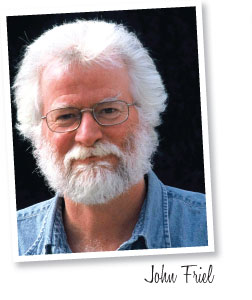12/1/2017
Say Something Else
John Friel

The late George Carlin said of words, “They’re my work, they’re my play, they’re my passion.” Well, Senator, I’m no George Carlin. But as a writer, it’s my prerogative and duty to rant and rail in defense of words.
Writers know, love and worship the power of words. They’re our craft, our raw material and our product. Most importantly, they’re our tools. Ill-used or overused, tools become chipped, blunted, ineffective. As any carpenter or sculptor will attest, it’s impossible to do fine, clean work with a dull chisel.
So let’s examine three instances of word abuse, shall we?
Double down: During last year’s interminable Presidential election, the breathless media declared that every candidate, especially the eventual winner, had doubled down on positions and promises several thousand times. It’s not so much that this blackjack term is being misapplied; comparing political activity to gambling is, sadly, apt. Haven’t you ever left the voting booth thinking the ballot was pretty much a crapshoot? No, it’s not the usage that grates, it’s the relentless ubiquitousness of the phrase. There’s no telling anymore who adapted it first, or when; if we knew, and I had a time machine, I’d backspace to that fateful moment and plead with him or her not to key it in. But I wouldn’t bet on success.
Mindfulness: This one is less widespread, but making serious inroads. In a well-constructed essay, psychologist Thomas Joiner bemoaned the growing overuse and misuse of “mindfulness,” currently creeping into everything from yoga to biking to diet choices. Certainly, let us be conscious of our decisions and their ramifications; but, says Joiner, the word’s real meaning bears no resemblance to the inward-gazing, narcissistic uses to which it’s being put. To be truly mindful is to be aware not just of our own presence, but of our place and importance—i.e., vanishingly small—in the larger world. The big picture is not a selfie.
Last, but by no means least: Sorry, George, but it’s ...
Passion. Enough already! I’ve had it up to my earwax with every symposium speaker and catalog declaring his/her/its personal or corporate “passion” for a chosen income stream. It’s especially obstreperous at symposia. Every third dais denizen exhorts the audience to find our passion and/or fund theirs.
Here’s why it cloys: The true definition of passion involves a willingness to suffer, to the point of death if necessary, for one’s cause or belief. Is anyone really that committed to, say, selling peat moss? Would your “passionate” insurance agent willingly suffer and die to swaddle your business in the perfect policies and not a penny less? I think not.
Passion is like a contagious, but fortunately benign, disease. You can give me a cold, or worse, but not via a YouTube tutorial. You can’t teach an audience to care passionately about something; you can only convey your own ardor. A wise person once said, “They won’t care how much you know until they know how much you care.” Don’t teach. Don’t preach. Infect.
Full disclosure: I’ve used the P-word myself, in a long-ago column, but have since sworn off—firmly. Fuller disclosure: I’ve met, and I hope you have also, horticulturists whose zeal for flora actually justifies the P-word, people who've put their money where their hearts are. They tend to be breeders or designers, and we’re all richer for their infectious fixations.
That’s my rant for the month. If you find any or all of the above on your lips, about to clutter the air, please swallow it. I’m getting downright pass—uh, mindf—uh, radical about this. GP
John Friel is marketing manager for Emerald Coast Growers and a freelance writer.